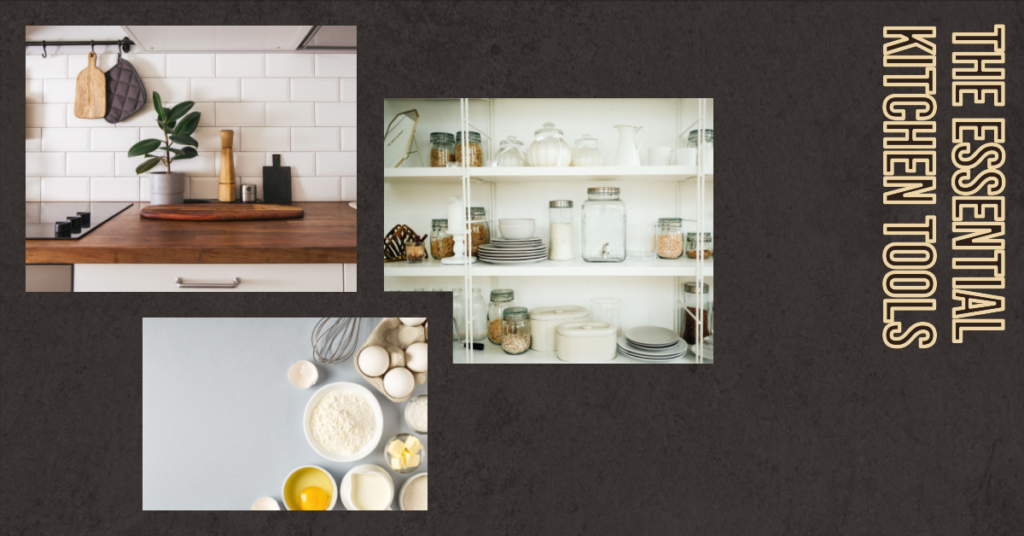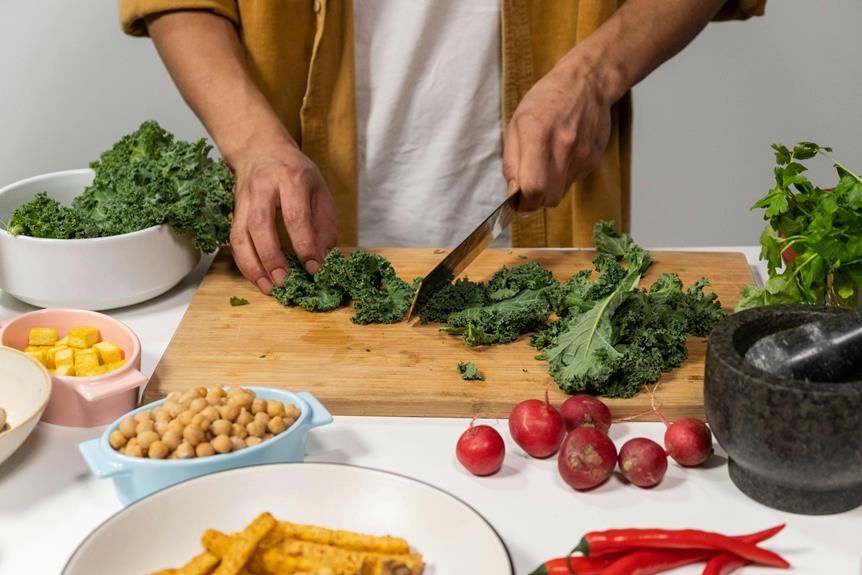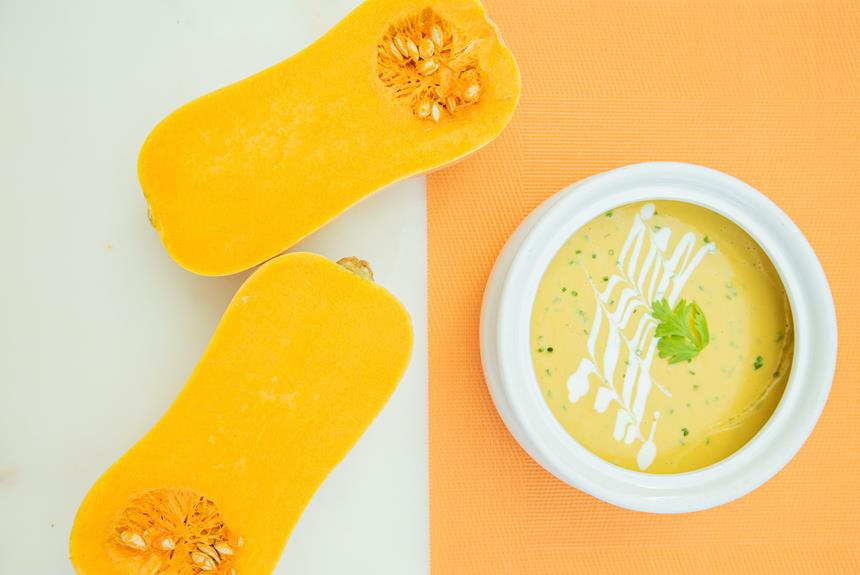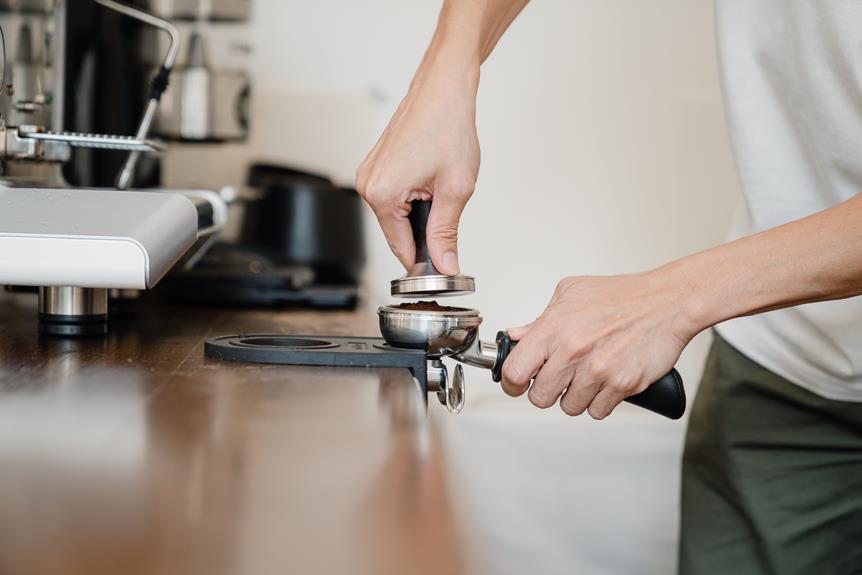To keep your kitchen spotless, you need a set of must-have cleaning tools. Start with dishwashing brushes for scrubbing tough pot and pan grime. Scrubbing sponges with dual sides tackle both gentle wiping and stubborn stains. Efficient microfiber cloths are perfect for streak-free surfaces. Always have an all-purpose cleaner at hand for versatile use and kitchen towels for drying and spills. Protect your skin with rubber gloves when handling harsh cleaners. Don't forget a dustpan and brush for quick debris pickup. Mastering these essentials transforms your cleaning routine, making it easier and more effective, inviting you to discover even more tips.
Dishwashing Brushes

When it comes to keeping your kitchen spotless, dishwashing brushes are indispensable tools. You'll find they make tackling dirty dishes much easier and more efficient. Unlike sponges, dishwashing brushes offer a firm grip and bristles that can reach into crevices and scrub away stubborn grime. They're perfect for those hard-to-clean pots and pans, ensuring you don't have to soak them for long periods.
Choosing the right dishwashing brush can greatly impact your cleaning experience. Look for brushes with durable bristles that can withstand vigorous scrubbing. A comfortable handle is also essential, as you'll want something that fits well in your hand to prevent slipping. Some brushes come with built-in scrapers, which are great for tackling baked-on food without damaging your cookware.
It's important to keep your dishwashing brush clean and sanitized. After each use, rinse it thoroughly and let it dry completely to prevent bacteria buildup. You can occasionally run it through the dishwasher if it's dishwasher-safe, ensuring it stays hygienic. By maintaining your dishwashing brush, you're extending its life and ensuring it remains effective in your kitchen cleaning routine. With these handy tools, you can keep your kitchen looking pristine.
Microfiber Cloths
Microfiber cloths are a game-changer for kitchen cleaning. They're made from ultra-fine fibers, which are perfect for grabbing onto dirt, grease, and bacteria, leaving your surfaces spotless. When you use them, you'll notice how effortlessly they clean without needing harsh chemicals. Just dampen the cloth with a bit of water, and you're ready to tackle countertops, appliances, and even stainless steel.
You'll appreciate that microfiber cloths are incredibly versatile. They work wonders on glass, ceramic, and tile, effortlessly wiping away smudges and fingerprints. Plus, they're gentle, so you don't have to worry about scratching delicate surfaces. This makes them ideal for cleaning everything from your kitchen table to fragile glassware.
Another great thing is their durability. Unlike paper towels, microfiber cloths are reusable. Just toss them in the washing machine after use, and they're good as new. This not only saves you money but also reduces waste, making them an eco-friendly choice.
When you're cleaning, always keep a few microfiber cloths handy. They'll quickly become your go-to tool, simplifying your routine and ensuring your kitchen stays sparkling clean without much effort.
Scrubbing Sponges

Scrubbing sponges are essential for tackling tough kitchen messes. When you're dealing with stubborn food residues or greasy pans, these sponges come to the rescue. Their dual-sided design usually features a soft sponge layer for gentle cleaning and a rough scrubbing layer for those hard-to-remove spots. This versatility makes them perfect for a variety of surfaces, from non-stick cookware to stainless steel sinks.
You'll want to have a few different types on hand to tackle various tasks. Heavy-duty sponges excel at scrubbing pots and pans, while gentler versions are ideal for more delicate surfaces. Be sure to choose a sponge that matches your cleaning needs to avoid scratching or damaging your kitchen items.
Hygiene is vital, so remember to replace your scrubbing sponges regularly. They can harbor bacteria if not properly maintained. Rinse them thoroughly after each use and let them air dry. You can also sanitize them by microwaving damp sponges for a minute or running them through a dishwasher cycle.
Kitchen Towels
Essential for keeping your kitchen clean and tidy, kitchen towels are versatile tools that you'll use daily. They're perfect for wiping down countertops, drying dishes, and even cleaning spills. Invest in a set of high-quality towels, as they'll stand up to frequent washing and last longer. Choose absorbent materials like cotton or microfiber. These fabrics quickly soak up liquids and can easily tackle kitchen messes.
When selecting kitchen towels, consider getting a variety of sizes and thicknesses. Larger towels are great for drying dishes, while smaller ones are perfect for quick clean-ups. Keep a few dedicated towels for specific tasks, like drying hands or dealing with raw meat spills, to prevent cross-contamination.
You'll find that kitchen towels are not just for cleaning. Use them as makeshift pot holders, or wrap them around a bottle of wine to keep it cool. They can even double as stylish napkins in a pinch. It's smart to have a couple of spare towels handy, as you'll likely go through several each day. Don't forget to wash them regularly to keep them fresh and ready for action!
All-Purpose Cleaner

An all-purpose cleaner is a powerhouse in your kitchen cleaning arsenal. It tackles a variety of surfaces, making it an essential tool for maintaining cleanliness and hygiene. With just one bottle, you can clean countertops, appliances, sinks, and even floors. This versatility means you won't need multiple specialized cleaners, saving you both money and storage space.
When choosing an all-purpose cleaner, look for one that's strong enough to cut through grease and grime but gentle on surfaces. Check the label for ingredients that are safe for your kitchen materials like granite, stainless steel, or laminate. Many options now come in eco-friendly formulations, which are better for you and the environment.
To use, spray the cleaner onto the surface and let it sit for a few moments to break down dirt and stains. Then, wipe with a clean cloth or sponge. For tougher spots, you may need to scrub a bit more. Remember to rinse surfaces that come into direct contact with food, ensuring no residue is left behind.
Incorporating an all-purpose cleaner into your kitchen routine simplifies your cleaning tasks, keeping your space spotless with minimal effort.
Baking Soda and Vinegar
Baking soda and vinegar are a dynamic duo for kitchen cleaning, offering a natural and effective solution for tackling stubborn grime. You'll find these two ingredients incredibly versatile for various tasks. Start by sprinkling baking soda on surfaces like countertops or inside the oven. It acts as a gentle abrasive, helping to lift away dirt without damaging surfaces.
Next, add vinegar, which reacts with baking soda to create a fizzy action that loosens grime and gunk. This is perfect for cleaning drains or getting rid of tough stains on your stovetop. Simply pour vinegar over the baking soda and let the fizzing do the hard work. After a few minutes, wipe it away with a damp cloth, and enjoy the shine.
Want to deodorize your fridge or trash can? Mix baking soda and vinegar in a small container and leave it inside. The combination neutralizes odors, leaving everything smelling fresh. You can also use this mix to clean your microwave. Place a bowl of water with vinegar inside, heat for a couple of minutes, and then wipe away the softened grime with ease. With baking soda and vinegar, keeping your kitchen sparkling is simple and cost-effective.
Rubber Gloves

When it comes to kitchen cleaning, rubber gloves are your best friend. They protect your hands from harsh chemicals, hot water, and gritty surfaces. You can tackle even the dirtiest tasks without worrying about your skin becoming dry or irritated. Think about scrubbing those grimy pots or tackling greasy stovetops—rubber gloves keep your hands safe and clean.
You'll find them especially useful when washing dishes. The insulation from hot water means you can use higher temperatures for better sanitation without discomfort. They also give you a better grip on slippery dishes, minimizing the risk of breakage. Have you ever fumbled with a soapy glass? With rubber gloves, that's less likely to happen.
Rubber gloves are also essential when dealing with strong cleaning agents. Whether it's bleach, ammonia, or other chemical cleaners, your skin stays protected. This not only prevents immediate irritation but also reduces the risk of long-term damage. Plus, you're less likely to absorb harmful substances through your skin.
Finally, they're easy to clean and store. Rinse them off after each use, let them dry, and they're ready for the next cleaning session. Don't overlook this simple yet effective kitchen cleaning tool.
Dustpan and Brush
A dustpan and brush set is an indispensable duo for maintaining a clean kitchen. You can quickly sweep up crumbs, bits of food, and other debris that inevitably accumulate on your kitchen floor. The brush's bristles effectively gather messes, while the dustpan's edge guarantees nothing escapes your grasp. This set is particularly handy after cooking or baking sessions, when remnants scatter across your countertops and floors.
Using a dustpan and brush is straightforward. Hold the dustpan at a slight angle on the floor, and sweep debris into it with the brush. You'll find it's much easier than dragging out a vacuum or mop for small messes. Opt for a set with a sturdy handle and dense bristles for best results, as these features guarantee durability and efficiency.
You can also use it for cleaning your countertops. Just gently brush crumbs and spills into the dustpan, keeping your surfaces spotless. This tool is compact, making storage convenient—just tuck it under the sink or hang it from a hook. With a dustpan and brush, you'll keep your kitchen tidy with minimal effort and maximum convenience.
Frequently Asked Questions
How Often Should Kitchen Cleaning Tools Be Replaced?
You should replace kitchen cleaning tools regularly. Sponges and dishcloths need replacing every 1-2 weeks. Brushes and scrubbers can last a few months. Always check for wear and tear to guarantee they're still effective and hygienic.
What Are Eco-Friendly Alternatives to Traditional Kitchen Cleaning Tools?
You can switch to eco-friendly options like bamboo dish brushes or biodegradable sponges. Consider using reusable cloths instead of paper towels. Opt for natural cleaning agents like vinegar or baking soda to reduce environmental impact.
Are There Specific Tools for Cleaning Stainless Steel Appliances?
A stitch in time saves nine. For stainless steel, use a microfiber cloth and specialized cleaner to prevent streaks. Avoid abrasive tools; they'll scratch surfaces. Regular maintenance keeps your appliances shining and extends their lifespan.
How Do I Organize and Store Kitchen Cleaning Tools Efficiently?
Use a caddy or basket to store your kitchen cleaning tools under the sink or in a pantry. Hang hooks for brushes and towels. Label containers for easy access, ensuring everything's organized and within reach.
Can Certain Cleaning Tools Damage Non-Stick Cookware Surfaces?
You should avoid using abrasive scrubbers or steel wool on non-stick cookware. They can scratch the surface, reducing its effectiveness. Opt for soft sponges or cloths to clean your non-stick items without causing damage.
At a Glance
You've got your arsenal of kitchen cleaning tools ready, and now it's time to roll up your sleeves. Remember, "a clean kitchen is the heart of a happy home." With dishwashing brushes and microfiber cloths in hand, you can tackle any mess. Scrubbing sponges and kitchen towels make quick work of spills, while trusty baking soda and vinegar handle the tough spots. Don't forget your rubber gloves! Armed with these essentials, you're all set for a sparkling kitchen.





